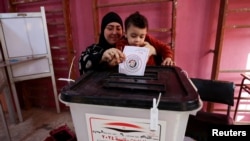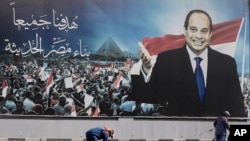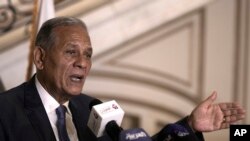If Sisi wins a new six-year term, his immediate priorities
would be taming near-record inflation, managing a chronic
foreign currency shortage and preventing spillover from the
conflict between Israel and Gaza's Hamas rulers.
Voting, which runs from 9 a.m. until 9 p.m. (0700-1900 GMT),
is spread over three days, with results due to be announced on
December 18.
Patriotic songs played on a loop as polling stations opened
on Sunday morning in Cairo, where pictures of Sisi proliferated
in the weeks leading up to the election. Riot police were
positioned at entrances to Tahrir Square in the capital's
centre, and Reuters reporters saw plainclothes police heavily
deployed at polling stations.
Critics see the election as a sham after a decade-long
crackdown on dissent. The government's media body has called it
a step towards political pluralism.
Three candidates qualified to stand against Sisi in the
election, none of them high-profile figures. The most prominent
potential challenger halted his run in October, saying officials
and thugs had targeted his supporters - accusations dismissed by
the national election authority.
Authorities and commentators on tightly controlled local
media have been urging Egyptians to vote, though some people
said days before the poll they did not know when it was taking
place. Others said voting would make little difference.
"I was aware there are elections happening, but I had no
idea when. I only knew that because of the massive Sisi
campaigns around the streets," said Aya Mohamed, a 35-year-old
marketing executive.
In a group of five female university students sitting in a
cafe in an affluent area of eastern Cairo, one said she would
vote for Sisi while the others were critical of him, saying they
would not vote as the result was a foregone conclusion.
'I Always Vote for Presidents'
As army chief, Sisi led the 2013 ousting of Egypt's first
democratically elected president, Mohamed Mursi of the Muslim
Brotherhood, before winning the presidency the following year
with 97% of the vote. He secured the same margin of victory in
2018.
He has overseen a crackdown that has swept up liberal and
leftist activists as well as Islamists. Rights groups say tens
of thousands have been jailed.
Sisi and his backers say the crackdown was needed to
stabilise Egypt and counter Islamist extremism. He has presented
himself as a bulwark of stability as conflict has erupted on
Egypt's borders in Libya, and this year in Sudan and Gaza.
"I will vote for Sisi of course. I love him," said Nabia
Ahmed, a 65-year-old mother of four voting in Bahr al Azam
Street in Giza. "I always vote for presidents. I am voting
because I want security for my children."
Several voters said that while they had to find ways to
adjust to rising prices, it was only Sisi and the military that
could provide security.
In Al Arish in northern Sinai, where the military has
extended its control after battling Islamist militants, a school
named after a dead soldier where pictures of victims of attacks
were displayed was being used as a polling station.
"Sisi secured our area for us. We have seen the most blood
spilled, the least we can do is vote for him," said Leila Awad,
a local education ministry official in a large group of civil
servants who had come to vote.
Soaring Prices
Egypt's fast-growing population of 104 million is struggling
with soaring prices and other economic pressures, with some
people complaining that the state has prioritised costly
mega-projects while taking on more debt.
"We are voting for him (Sisi)," said Sabreen Khalifa, a
40-year-old mother of five in Giza. "But we want him to bring
down the prices. Food, medicine, rent... it's all very
expensive."
Some Sisi supporters expressed admiration for infrastructure
projects and echoed statements from Sisi and other officials
blaming economic woes on external shocks.
Behind the polling station, a Reuters reporter saw bags
containing flour, rice and other basic commodities being handed
out to people who showed ink stains on their fingers indicating
they had voted.
Some expressed disappointment that the bags did not contain
sugar, recently subject to sharp price rises. Two Reuters
reporters saw voters being bussed into polling stations.
Scheduled power cuts linked to reduced gas supplies have
been suspended during voting days, two electricity ministry
sources said.
The election campaign has been low-key, with Sisi following
a typical program of opening an arms trade fair, inspecting
roads and sitting in on examinations for candidates to join
military and police academies in the week ahead of the vote.
Some analysts say the election, originally expected in early
2024, was brought forward so economic changes - including
devaluation of an already weakened currency - could be
implemented afterwards.
The International Monetary Fund on Thursday said it was in
talks with Egypt about additional financing under an existing $3
billion loan program that stalled because of delays to sales
of state assets and a promised shift towards a more flexible
exchange rate.
"All indicators suggest that we're going to move quite
quickly after the election in terms of proceeding with the IMF
reform," said Hany Genena, chief economist at investment bank
Cairo Financial Holding.











Forum